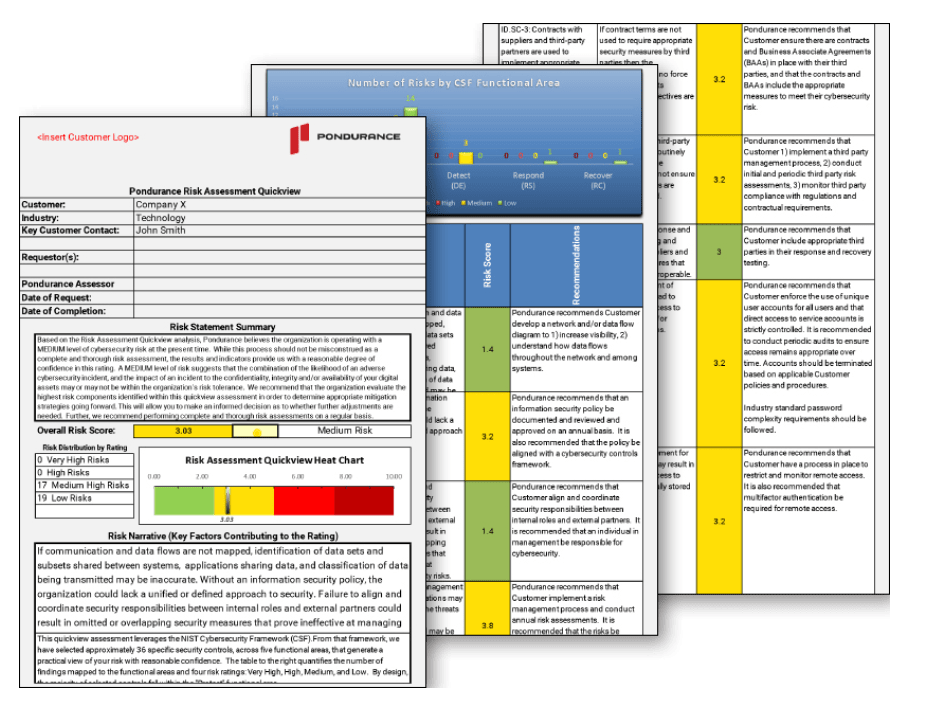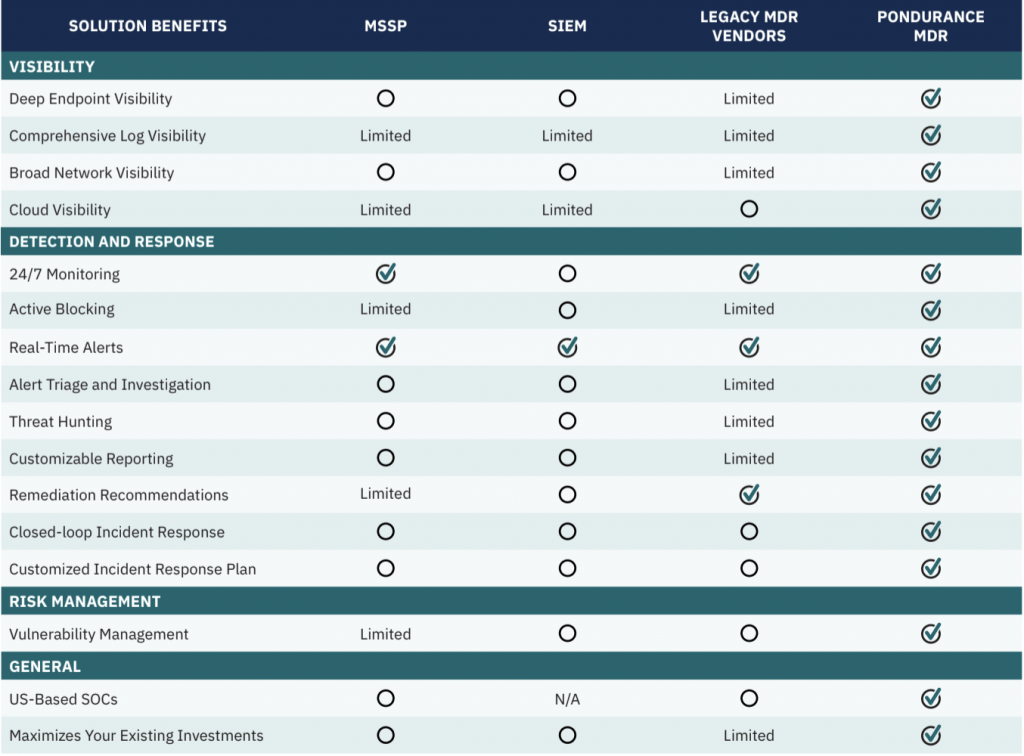

We thought we had been making the right security investments. Then we had an incident and brought in Pondurance. They immediately proved their value and earned our trust due to their immense expertise and guidance throughout the entire process. We simply wouldn‘t have been successful without them.
Steve Long, President & CEO, Hancock Health
Want to review more case studies? LEARN MORE

Download our comparison chart to see the difference between SIEMs, MSSPs, other MDRs and Pondurance MDR.

The realm of cybersecurity has seen unprecedented growth in recent years, with an increasing number of businesses and organizations seeking solutions to protect their digital assets from cyber threats. A key player in this landscape is the Managed Detection and Response (MDR) service, which offers a comprehensive approach to threat detection, response, and containment.
To understand what MDR is in cybersecurity, it is essential first to comprehend the typical challenges faced by organizations when dealing with cyber threats. Traditional security measures may often leave gaps that hackers can exploit, leading to data breaches or other forms of cyber attacks. This is where an MDR solution comes into play—it aims to identify these vulnerabilities and address them proactively.
Managed Detection and Response involves a combination of advanced technologies, expert analysis, and rapid incident response capabilities designed to detect and mitigate potential threats before they cause significant damage. By continuously monitoring an organization’s network for signs of suspicious activity or intrusion attempts, an MDR service helps ensure that any potential threats are identified swiftly, allowing a prompt response.
One must consider the rapidly evolving landscape of cybersecurity when discussing MDR solutions. MDR research indicates that organizations are increasingly adopting these services as part of their overall security strategy due to their ability to provide a higher level of protection than traditional methods alone.
In fact, researchers predict that by 2025, 50% of all organizations will be using MDR services. Managed Detection and Response (MDR) services typically include a range of offerings aimed at providing comprehensive protection against cyber threats. It is worth noting that while Managed Detection and Response services can significantly enhance an organization’s cybersecurity posture, they should not be seen as a replacement for traditional security measures. Rather, MDR solutions may be viewed as an additional layer of protection, working in tandem with existing defensive tools and strategies to ensure a holistic approach to cybersecurity.
The growing prominence of MDR in the cybersecurity landscape is indicative of both the increasing complexity of cyber threats and the recognition that traditional security measures alone may not suffice to defend against them. Managed Detection and Response services provide organizations with a comprehensive approach to threat detection, response, and containment – ensuring that potential vulnerabilities are identified and addressed promptly before they can cause significant damage. By adopting an MDR solution alongside existing security measures, businesses can significantly enhance their protection against today’s dynamic cyber threat landscape.
Endpoint detection and response (EDR) and managed detection and response (MDR) are two vital security services that organizations use to protect their networks and systems from cyber threats. Both of these services play an essential role in detecting, analyzing, and responding to potential security incidents. Understanding the differences between MDR vs EDR can help organizations make informed decisions about which security approach is right for their needs.
EDR security focuses on monitoring endpoints such as workstations, servers, and mobile devices within an organization’s network. It collects detailed information on system events, processes, and behaviors to detect possible malicious activities.
EDR solutions primarily rely on automated threat detection capabilities using technologies such as machine learning or behavioral analytics to identify unusual patterns or signs of compromise. EDR tools also facilitate incident response by providing IT teams with the necessary data to investigate suspicious activities and remediate threats quickly.
On the other hand, MDR cybersecurity offers a more comprehensive approach by incorporating human expertise in threat detection and response efforts. So, what is MDR in cybersecurity? Managed service providers (MSPs) typically deliver MDR services, allowing organizations to leverage external cybersecurity experts who continuously monitor their networks for signs of compromise.
This means that MDR not only includes advanced technology but also encompasses skilled analysts who can provide context for identified threats and give tailored recommendations on how to respond effectively.
The key difference between what is MDR compared to EDR lies in the level of human involvement. While both approaches aim to identify potential threats, MDR offers a higher degree of hands-on support from cybersecurity professionals who actively assist with incident management. As the cybersecurity landscape continues evolving, new concepts like extended detection and response (XDR) have emerged as well.
XDR vs EDR represents an even broader scope of protection, combining various security components such as endpoint protection platforms (EPP), network traffic analysis (NTA), email security gateways (ESG), cloud access security brokers (CASB), among others. XDR aims to provide a more unified and holistic view of an organization’s security posture, integrating data across multiple sources to detect, analyze, and respond to threats faster and more efficiently.
When considering MDR vs EDR or even the newer concept of XDR, organizations must evaluate their specific security needs and resources:
With a primary focus on Managed Detection and Response (MDR), these solutions offer comprehensive security coverage that includes advanced analytics, proactive threat hunting, and swift incident response capabilities.
As part of MDR compliance, organizations are expected to adhere to specific regulations and standards related to data protection, privacy, and overall network security. These regulations include the General Data Protection Regulation (GDPR) in Europe and the Health Insurance Portability and Accountability Act (HIPAA) in the United States. By adopting an MDR solution with robust features, companies can work to achieve full regulatory compliance while safeguarding their sensitive information from unauthorized access.
Incident response is another crucial aspect of effective MDR solutions, as it involves rapidly identifying, containing, eradicating, and recovering from cyberattacks. Swift action in the face of a breach is essential to minimize damage, preserve business continuity, and maintain customer trust. A well-rounded MDR solution features an integrated incident response framework that leverages automation alongside human expertise to quickly address identified threats.
The blend of technology-driven processes with seasoned security analysts helps ensure that incidents are handled efficiently and effectively before they escalate into debilitating crises. Moreover, threat hunting plays a central role in proactive cybersecurity strategies embraced by leading MDR solutions. This process goes beyond traditional detection methods by actively seeking out potential vulnerabilities within an organization’s network infrastructure before they can be exploited by malicious actors.
By employing cutting-edge threat intelligence detectors combined with real-time monitoring and analytics capabilities, MDR solutions can help uncover hidden attack vectors that might otherwise go unnoticed.
A comprehensive MDR solution will typically feature several key components:
By leveraging these capabilities, businesses can take a proactive stance against cyber threats while working to ensure that regulatory obligations are met. This approach often results in a more secure environment that fosters trust among customers and partners alike, which stands to contribute to the organization’s long-term success.
Managed Detection and Response (MDR) services have rapidly emerged as a crucial component in the ever-evolving landscape of cybersecurity. These cutting-edge offerings provide organizations with comprehensive security solutions designed to safeguard their digital assets and protect against an array of cyber threats. It can be helpful to analyze the top MDR providers, the unique features and benefits of MDR services, and how MDR services contribute to a robust cybersecurity infrastructure.
Top MDR providers might distinguish themselves from competitors by offering advanced capabilities, such as artificial intelligence (AI) powered threat detection, and continuous monitoring across multiple platforms.
As businesses increasingly rely on digital tools for daily operations, partnering with these leading solution providers can prove increasingly appealing for organizations looking to ensure a strong security posture.
In the realm of MDR services cybersecurity is prioritized through various strategies that focus on detecting potential risks early and responding swiftly to minimize damage. For instance, AI-driven threat detection helps identify unusual patterns that may indicate cyberattacks or breaches before they escalate into full-blown crises. Meanwhile, real-time monitoring ensures continuous vigilance over an organization’s network environment to detect and address vulnerabilities proactively.
MDR support plays a pivotal role in protecting businesses from cyber threats by providing them with the tools necessary for prompt remediation. Support teams work closely with clients to understand their specific needs and tailor solutions accordingly. This level of customization allows organizations to develop robust cybersecurity measures that reflect their unique risk profiles while staying compliant with industry regulations.
Another important aspect within this domain is collaboration between MDR security vendors who offer specialized products aimed at enhancing overall protection levels. By working together, these vendors can create comprehensive solutions that tackle various aspects of cybersecurity—from threat intelligence gathering to incident response planning.
This is particularly critical considering the increasing sophistication of cybercriminals who often employ multi-stage attacks orchestrated across several platforms. To effectively combat these threats, MDR solution providers are at the forefront of developing and implementing innovative security strategies.
Some key offerings include advanced analytics for detecting anomalies, cloud-based services that facilitate rapid response to incidents, as well as integrations with other cybersecurity tools such as Security Information and Event Management (SIEM) systems. These capabilities not only help organizations stay ahead of emerging threats but also enable them to optimize their security resources through streamlined operations.
Finally, MDR consulting services can prove valuable to businesses looking to bolster their defenses against cyber risks. By leveraging the expertise of seasoned professionals, organizations can often develop holistic cybersecurity strategies that incorporate best practices and cutting-edge technologies. MDR consultants can also provide guidance on regulatory compliance, risk management, and incident response planning—helping organizations ensure that they maintain a strong security posture in an increasingly hostile digital landscape.
MDR services have emerged as an important element of many modern cybersecurity frameworks. By partnering with top MDR providers and leveraging their diverse array of support, solutions, and consulting offerings, businesses can often safeguard themselves against cyber threats while staying compliant with industry regulations. As cybercriminals continue to evolve their tactics and target unsuspecting organizations across various sectors, investing in robust MDR services can be quite important.